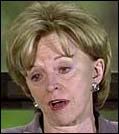
"Academic freedom is facing its most serious threat since the McCarthy era of the 1950s," according to Beshara Doumani, associate professor of history. University campuses are threatened with the combined forces of coercion and privatization, he says, leaving the academy more vulnerable than ever to outside political and economic forces.
A Palestinian whose academic specialty is the modern social history of the Middle East, Doumani has taken time from his usual field of study to examine the historical, legal, and social interpretations of academic free speech in this country. Two years ago he organized a conference at Berkeley on the topic; he has now edited a book based on that conference, Academic Freedom After September 11, which will be published this month by Zone Books...
During the McCarthy era, federal intelligence agencies used the Cold War as a reason to impose various restrictions, including on academic freedom. "Now," Doumani says, "private groups are playing the leading role in conducting national, and well-funded, campaigns to police thought in the academy." He points to such movements as Campus Watch, which targets Middle East scholars and programs critical of U.S. foreign policy and of Israel; David Horowitz's right-wing "Academic Bill of Rights" campaign, which aims to "balance" the "liberal academy"; and the American Council of Trustees and Alumni � co-founded by Lynne Cheney, the wife of the vice president � which has called universities the weak link in the war against terror....
"Since 9/11, the two movements of privatization and coercion are intersecting," Doumani concludes. "This creates a situation which demands of us that we not only stand up and defend academic freedom, but that we ask ourselves: What is academic freedom? How is it relevant to the new phase of the academy and the political system in this country? And, importantly, what is the role of the intellectual in this society?"
http://www.berkeley.edu/news/berkeleyan/2006/03/01_freedom.shtml